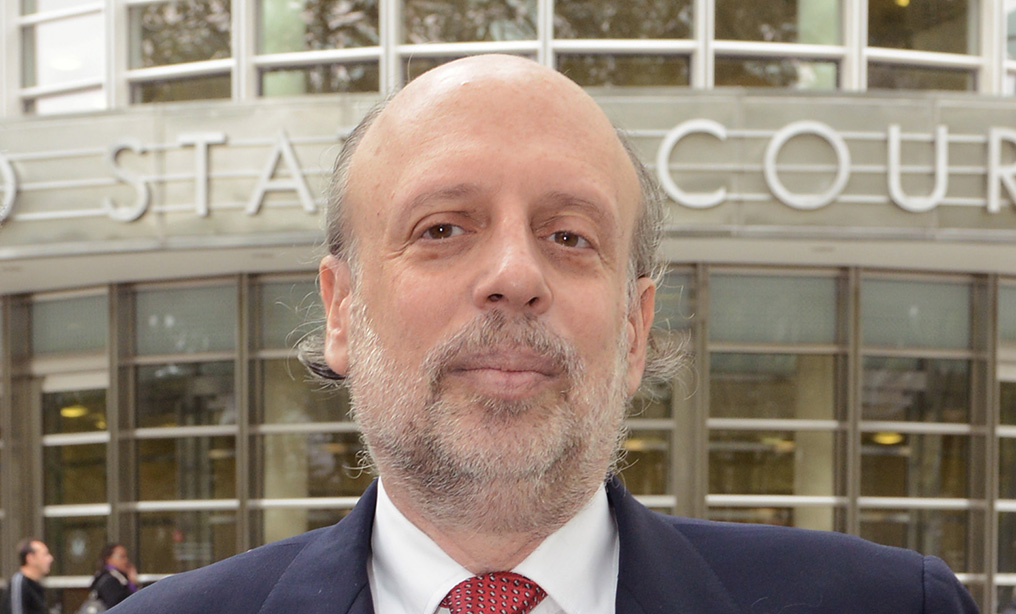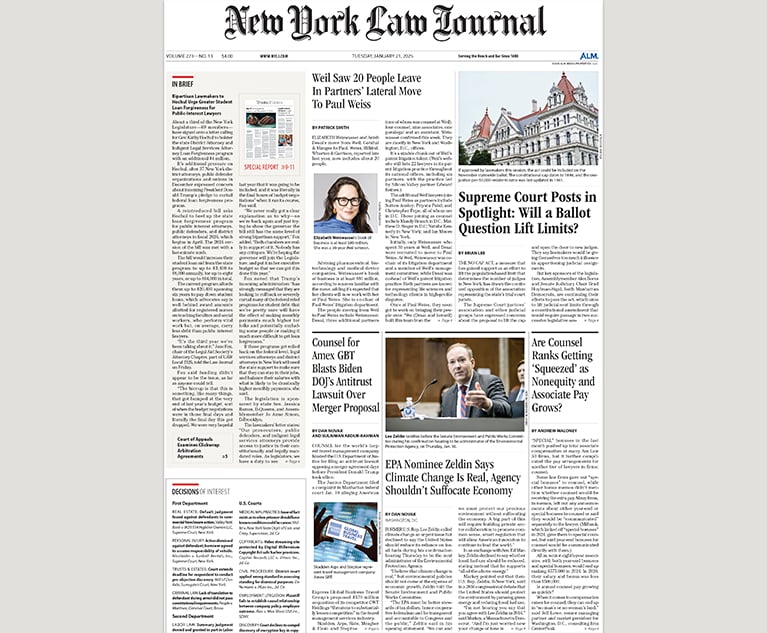Criminal Contempt Investigation of Attorney Prompts Subpoena Fight Before Circuit
A recent argument before the Second Circuit makes clear that a criminal contempt investigation is still underway against recently disciplined attorney Frederick Oberlander.
September 16, 2019 at 03:56 PM
5 minute read
 Frederick Oberlander. Photo: Rick Kopstein
Frederick Oberlander. Photo: Rick Kopstein
Frederick Oberlander, a lawyer who has been disciplined over his use of sealed material, is still tangling with federal prosecutors over their ability to subpoena his files in a long-running criminal contempt investigation.
U.S. District Judge Brian Cogan of the Eastern District of New York referred Oberlander and his lawyer Richard E. Lerner to prosecutors more than seven years ago to consider charging them with criminal contempt for threatening to expose businessman Felix Sater's cooperation with the government. The alleged threat came in the context of litigation involving the Bayrock Group, a real estate company where Sater worked.
Three years ago, Cogan accused prosecutors of taking a lax approach to a case where it seemed one of their informants was being put in danger. Still, no charges have been brought.
A recording of a recent argument before the U.S. Court of Appeals for the Second Circuit makes clear that an investigation is still underway, however.
Rick Belliss, a prosecutor from the U.S. Attorney's Office in the Northern District of New York, and Oberlander squared off before the Second Circuit on Aug. 26 over claims that Oberlander defied a grand jury subpoena by refusing to turn over files from his law firm.
During argument, Belliss mentions a lower judge's finding of civil contempt and a $1,000-a-day penalty against Oberlander for failing to comply with subpoenas from the contempt investigation, although it's not clear whether those were subjects of the appeal because the parties' briefs aren't publicly available.
Oberlander argued that the law is on his side, saying prosecutors had the mistaken idea that he could be compelled to turn over documents from when he was a sole proprietor. He said he only began practicing law through a corporate entity in 2013 and said there is no legal doctrine stating that a business takes possession of records created by its principal prior to that point.
"I cannot be compelled to turn over those documents that were created when I was a sole proprietor," Oberlander said. "Otherwise, everything I ever wrote, back to when I passed the bar in 1982, became a corporate document, and that just can't be."
Oberlander said the grand jury that issued one subpoena of his firm had been released, freeing him of any obligation to turn over records. One member of the panel, Second Circuit Judge Rosemary Pooler, seemed skeptical of that argument and asked whether Oberlander would comply with any subpoena; he said he had, in fact, complied with what he was required to comply with.
Another of the three judges hearing argument, Judge Richard Sullivan, held prosecutors' feet to the fire. While Belliss argued that a case before the D.C. Circuit regarding a subpoena for documents was most similar to Oberlander's case, Sullivan asked him why he didn't rely on Second Circuit's own decision in the 1926 case Loubriel v. United States, which dealt with testimony.
"I'm curious why our own precedent doesn't compel the same result," Sullivan asked. "Why would you make a distinction between testimony and documents?"
"The distinction is, your honor, with these facts and the track record, it made sense for the lower court to direct Mr. Oberlander — " Belliss began.
"'It made sense,' is the reason," Sullivan interjected.
"Yes, your honor," the prosecutor said, accusing Lerner and Oberlander of dilatory tactics.
Oberlander concluded by seeking to rebut the prosecutor's points and by describing how he had developed a very severe case of lung cancer and suffered from other maladies that required him to seek multiple extensions of time over the years.
"Forgive me if I'm in a coma, if I can barely walk two blocks or three blocks, or if I have traumatic brain injury and can't read," he said. "The idea that I ran out the clock is personally offensive to me."
Judge Ralph Winter, the third judge on the panel, was mostly silent during argument.
The oral arguments took place about two weeks before Oberlander was ordered suspended for a year by New York attorney disciplinary authorities. That penalty is supposed to take effect in October. It was based on a decision by a federal lawyer disciplinary body in the Eastern District of New York that was issued last year but has not gone into effect because it is under appeal.
Reached by phone Monday, Oberlander and Lerner both said they had no reason to believe the criminal investigations against them had ended, but both noted potential statute-of-limitations defenses because the investigation has taken so long.
"If I had been engaged in [trying to extort Sater], do you really think I wouldn't have been in jail a long time ago?" Oberlander asked.
Lerner declined to say whether he had a similar dispute with prosecutors.
A spokesman for the U.S. Attorney's Office for the Northern District of New York declined to comment.
This content has been archived. It is available through our partners, LexisNexis® and Bloomberg Law.
To view this content, please continue to their sites.
Not a Lexis Subscriber?
Subscribe Now
Not a Bloomberg Law Subscriber?
Subscribe Now
NOT FOR REPRINT
© 2025 ALM Global, LLC, All Rights Reserved. Request academic re-use from www.copyright.com. All other uses, submit a request to [email protected]. For more information visit Asset & Logo Licensing.
You Might Like
View All
Neighboring States Have Either Passed or Proposed Climate Superfund Laws—Is Pennsylvania Next?
7 minute read
Trending Stories
Who Got The Work
J. Brugh Lower of Gibbons has entered an appearance for industrial equipment supplier Devco Corporation in a pending trademark infringement lawsuit. The suit, accusing the defendant of selling knock-off Graco products, was filed Dec. 18 in New Jersey District Court by Rivkin Radler on behalf of Graco Inc. and Graco Minnesota. The case, assigned to U.S. District Judge Zahid N. Quraishi, is 3:24-cv-11294, Graco Inc. et al v. Devco Corporation.
Who Got The Work
Rebecca Maller-Stein and Kent A. Yalowitz of Arnold & Porter Kaye Scholer have entered their appearances for Hanaco Venture Capital and its executives, Lior Prosor and David Frankel, in a pending securities lawsuit. The action, filed on Dec. 24 in New York Southern District Court by Zell, Aron & Co. on behalf of Goldeneye Advisors, accuses the defendants of negligently and fraudulently managing the plaintiff's $1 million investment. The case, assigned to U.S. District Judge Vernon S. Broderick, is 1:24-cv-09918, Goldeneye Advisors, LLC v. Hanaco Venture Capital, Ltd. et al.
Who Got The Work
Attorneys from A&O Shearman has stepped in as defense counsel for Toronto-Dominion Bank and other defendants in a pending securities class action. The suit, filed Dec. 11 in New York Southern District Court by Bleichmar Fonti & Auld, accuses the defendants of concealing the bank's 'pervasive' deficiencies in regards to its compliance with the Bank Secrecy Act and the quality of its anti-money laundering controls. The case, assigned to U.S. District Judge Arun Subramanian, is 1:24-cv-09445, Gonzalez v. The Toronto-Dominion Bank et al.
Who Got The Work
Crown Castle International, a Pennsylvania company providing shared communications infrastructure, has turned to Luke D. Wolf of Gordon Rees Scully Mansukhani to fend off a pending breach-of-contract lawsuit. The court action, filed Nov. 25 in Michigan Eastern District Court by Hooper Hathaway PC on behalf of The Town Residences LLC, accuses Crown Castle of failing to transfer approximately $30,000 in utility payments from T-Mobile in breach of a roof-top lease and assignment agreement. The case, assigned to U.S. District Judge Susan K. Declercq, is 2:24-cv-13131, The Town Residences LLC v. T-Mobile US, Inc. et al.
Who Got The Work
Wilfred P. Coronato and Daniel M. Schwartz of McCarter & English have stepped in as defense counsel to Electrolux Home Products Inc. in a pending product liability lawsuit. The court action, filed Nov. 26 in New York Eastern District Court by Poulos Lopiccolo PC and Nagel Rice LLP on behalf of David Stern, alleges that the defendant's refrigerators’ drawers and shelving repeatedly break and fall apart within months after purchase. The case, assigned to U.S. District Judge Joan M. Azrack, is 2:24-cv-08204, Stern v. Electrolux Home Products, Inc.
Featured Firms
Law Offices of Gary Martin Hays & Associates, P.C.
(470) 294-1674
Law Offices of Mark E. Salomone
(857) 444-6468
Smith & Hassler
(713) 739-1250








